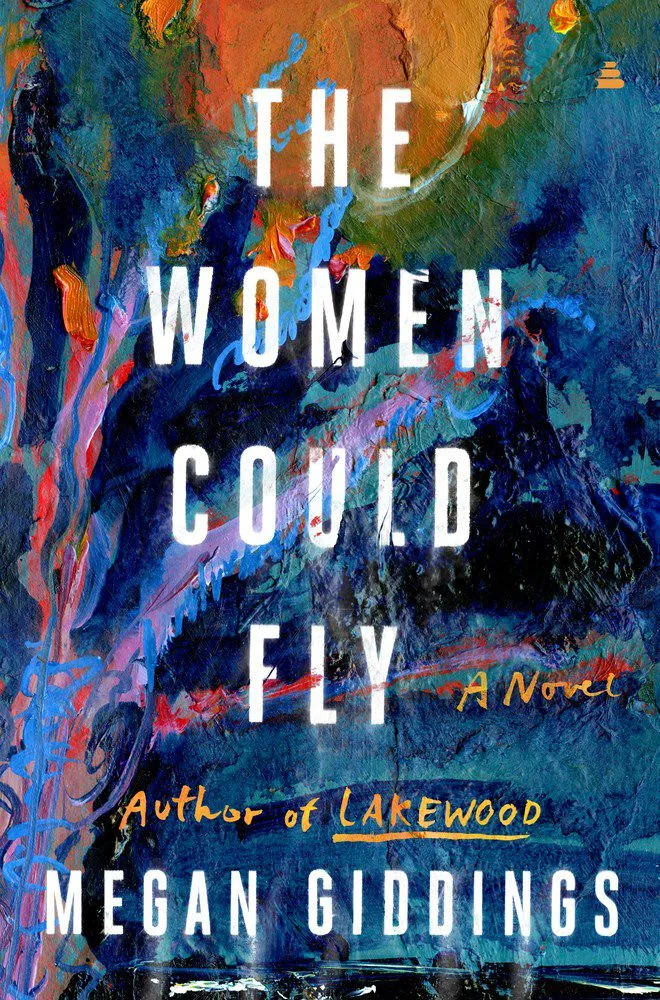The Women Could Fly and Landscape Reflections


The Women Could Fly, a novel by Megan Giddings, is set in a world like ours, except the misogyny's a bit more blatant: women must marry men or else register to be carefully watched, and the accusation of witchcraft could lead to execution. Magic is real in the book—and wonderfully strange—but we work our way to that realization gradually. Some characters deny its existence, while those hunting witches look for clues that seem too absurd to be taken seriously. The main character is Jo, a woman under extra suspicion due to the mysterious disappearance of her mother.
I want to look at a passage that occurs midway in the novel, when Jo is on a boat on Lake Superior, headed for an island that she has learned about through her mother's will.
The sky and lake were mirrored. There was a succulence to the clouds on both. I thought if I opened my mouth wide enough, they could float in, dissolve sweet on my tongue. But the sky changed as we moved farther and farther away from the shore—from September-day brightness to crepuscular. The air turned colder. We slowed. The water's texture transformed into something closer to velouté, the sky total-eclipse dark.
I'm interested in the subtext here, how landscape (or seascape or skyscape) can represent the inner self of the character viewing it, and how this passage twists that concept in a delightful way, creating a stranger and more electric sense of the character and of the world.
Because we're seeing the sky and water through Jo's eyes, it can't help but feel like a reflection (in both senses) of her inner self or mood, especially as it's a careful description told during a quiet moment. The word "mirrored" confirms that feeling. After all, if Jo is seeing a reflection, she must be seeing herself.
But this mirroring gets weirder, because it's two opposites, "the sky and the lake," reflecting each other. The construction of the sentence is interesting. You might expect the lake to reflect the sky, but it's not said that way. Instead, both "are mirrored." When we understand that the sky also reflects the lake, the mirror springs to life in two directions. The two surfaces reflect each other, creating that dizzying effect of two mirrors repeating into infinity.
All of this strange reflection makes me think about how magic loves to play with cause and effect. I understand that the view is telling me something about Jo, but the relationship is more alive than usual and seems to go both ways. Maybe Jo is influencing her surroundings, or maybe her surrounds have power over her. In any case, the power dynamics are not simple but complex and move in more than one direction.
In this book, the coming alive of one's surroundings has been established as a sign of witchcraft. What the characters watch for (think: talking animals) is much more conspicuous than what happens in this passage, but the description still gestures to something alive in the relationship between self and world. It's a small hint of the sort of magic everyone is watching for.
The view is also alive because it is changing. We are told plainly that the sky and the light shift in feel and appearance and we also observe them change in real time as they are described one way, then another. And I'm intrigued that it's not the color of the water—as one would expect in response to the light--that becomes like velouté, but the texture of it. The water having texture makes it more visceral, and again more alive.
But the sky and water aren't just changing; they're evolving in response to Jo and the boat she is on. Look at the way a sequence of events is related: "The air turned colder. We slowed. The water's texture transformed." We don't get words like "because" or "so" between these sentences, which would confirm causation in one direction, but deny it another. Instead, they each stand alone, inviting the reader to speculate about the relationship of these happenings. And yet the action of "we" is placed carefully between changes in the sky and water, so they seem all tied up together. I can't say with certainty that one causes another, but I sense that they are somehow making each other happen.
The relationship between Jo and her environment becomes even stranger when she imagines eating those "succulent" clouds that "dissolve sweet on my tongue" and when the water is compared to velouté, the sauce. When we imagine her sucking the sky and lake into her body, it's as if the outer world becomes a physical part of her, instead of just a metaphor for her soul. It's another way the relationship of cause and effect and of reflected and reflector is twisted.
I'm also interested in a couple of words that are used in unexpected ways, pulling in additional meaning and powerful subtext.
Succulence is the first. It means the clouds look to Jo as if they'd taste rich and juicy and delicious. Additionally, it sounds like the word "suck," as if she could sip them by a straw. That's the surface meaning. But a succulent is also a kind of plant and that's the image that first came to my mind when I read the word. They're cactuses—less like something that will be juicy and delicious, but like something dry that will suck up the juice of the air around it. And so the word sucks in both directions. Again, the passage plays with the direction of the flow of energy.
"Crepuscular" is another that jumps at me. In this passage, it means having to do with twilight, that the sun is setting and it's the half-light of dusk. Of course this makes sense. But I'm more used to animals being described as crepuscular. In that sense the word doesn't mean simply of twilight but, active during twilight. Thus the light—and the whole scene—becomes like an animal awakening.
And I think that's my point about the setting described in this passage. It feels reflective, sure, but it also feels charged—with life—and with energy that flows in unexpected directions.
A moment like this is getting us ready for something. I won't spoil it, but that something comes very soon. It is churning the space and the character inside out, in preparation for a change, a powerful one.
